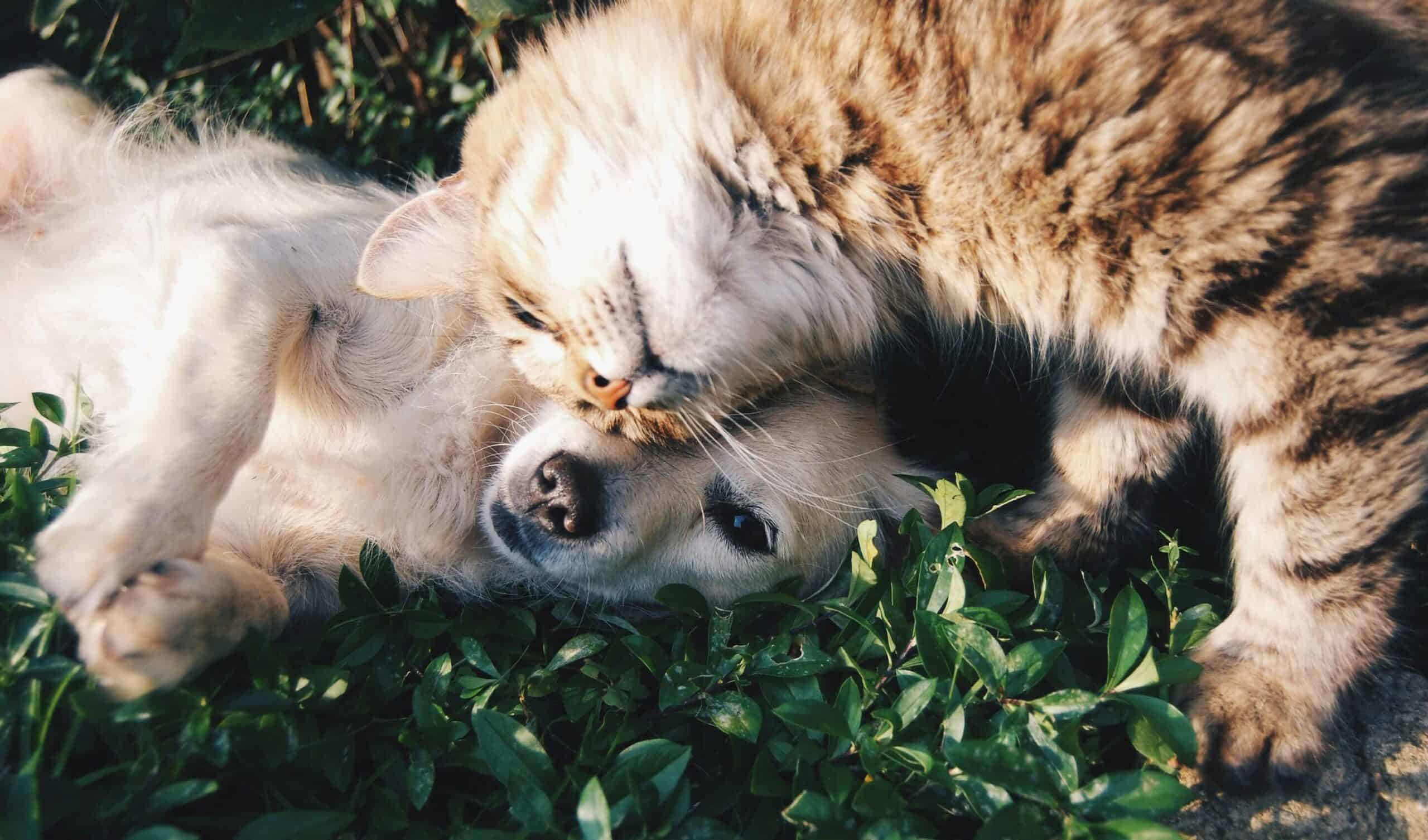Should you Get a Cat or Dog?
Posted by Lora Shaw on December 18, 2018

Do you know you want to get a pet but can’t decide between a dog or a cat? If so, you need to read our post. Learn how dog and cat ownership differ, and which important factors you should consider before choosing one over the other.
Key Takeaways
Here are some key takeaways of our full post:
- Dogs are well suited for active people, those who have a backyard, and those who are home often
- Cats are well suited for people who may be busier and looking for an independent companion
- Dogs and cats require different training techniques
- There are various factors to consider before adopting a pet, such as expense, allergies, where you’re adopting from, and your amount of free time
Who Are Dogs Best For?
While different dog breeds have different characteristics, you’ll find that dogs are best suited for people who don’t mind moderate activity and spending time outdoors on a regular basis. Also, dogs need more stimulation and activity than cats do to keep them happy and healthy. For that reason, dogs are a good choice for people who don’t work long hours or travel often.
Finally, while some smaller dogs do well in apartments, most larger breeds have bigger space requirements and need a yard to run around in. That’s why dogs tend to be better suited for homeowners.
What to Know When It Comes to Training Dogs
When adopting a dog, it’s important to be prepared to train them. Training has no specific timeline, but it requires consistency and patience. Here’s what to expect when it comes to training a dog:
- Determine what you want to teach – You may want to teach your dog basic commands such as sit, stay, and come, or more complicated tasks such as fetching a ball, potty training, and more.
- Use positive reinforcement – To successfully train your dog, you’ll want to use positive reinforcement to reward desired behaviors for your pup. This will help encourage your dog to repeat these behaviors.
- Socialize your dog – If your dog will be interacting with other people regularly, it’s important to get them accustomed to people early so they’re prepared to meet new ones as they grow. This will help make your dog more comfortable and give you the chance to teach them how to act appropriately around others.
- Practice often – Ideally, you’ll want to practice training methods with your dog a couple of times a day in short sessions. Consistent practice will help reinforce good behavior in your dog over time.
Who Are Cats Best For?
Cats require much less time, attention, and energy than dogs. Plenty of cats are happy to be left alone throughout the day while they sleep and entertain themselves. That’s why cats tend to be a good choice for people who are looking for a more independent companion.
Cats also need less indoor space, making them ideal for individuals living in smaller homes. As long as cats have a litter box, scratching post, and window to look out of, they’re usually fairly content in an apartment.
What to Know When It Comes to Training Cats
Cats are able to be trained, but it may require different techniques than those you would use with dogs. Here’s what to expect when training a cat:
- Understand your cat’s behavior – Cats have their own instincts and preferences, so it’s important to keep this in mind when developing a training regimen for your cat.
- Use positive reinforcement – Just like dogs, cats enjoy being rewarded when completing a positive behavior. This will make training fun and help you and your cat develop a connection together.
- Create a positive environment – You will want your home or area for training to be a space that your cat feels comfortable and safe in. Ideally, this would also be a place that is quiet and distraction-free.
- Practice patience – Cats have their own distinct personalities, so you’ll need to be patient and work with them to build good behaviors over time.
What Should I Consider Before Choosing a Pet?
Here are some important factors to consider before choosing your pet:
- Expense – Dogs tend to cost more than cats. If you love dogs and cats fairly equally but have a tight budget, you’ll find that cats will be easier on your wallet. Generally speaking, you can expect to spend $1,314 – $1,843 in your dog’s first year of life. By contrast, cats average $1,035 their first year.
- Allergies – You probably already know whether you have pet allergies, but do you know whether your family members and close friends do? It would be really upsetting to bring a new pet into your life and later learn you couldn’t keep it due to allergies. For that reason, you should check whether any of your frequent visitors are allergic to dogs or cats before selecting your pet.
- Where you’re adopting from – You’ll want to research the specific location you want to adopt from so you can understand the adoption requirements. We encourage you to adopt your dog or cat from a shelter so you can give a furry friend a second chance at a loving home.
- Your free time – Finally, you should consider how much free time you have before choosing a pet. How much time do you have each day for leisure? Of that time, how much of it do you think you’d want to spend with your pet? The less free time you have, the better off you’d be with a cat as a pet.
FAQS About Adopting a Cat or Dog
Can cats and dogs live together peacefully?
Yes! With proper introduction, training, and supervision, cats and dogs can coexist with each other, and even become each other’s best friends. Here are some tips if you’re planning on being a dog and cat parent:
- Introduce the dog and cat to each other gradually
- Give positive reinforcement when they behave well together
- Provide separate spaces for each of them
- Train both with basic commands
- Respect each animal’s preference when interacting
How do I know if I’m allergic to cats or dogs?
If you’re allergic to dogs or cats, you may exhibit the following symptoms when you’re around them:
- Sneezing
- Runny or stuffy nose
- Itchy eyes
- Coughing
- Skin reactions
- Throat irritations
- Shortness of breath
It’s important to consult with a healthcare professional to be certain, but if you experience these symptoms, you may be allergic.
How often do cats and dogs need to visit the vet?
During the first year, puppies and kittens need to visit the vet regularly for checkups and vaccinations. Once they turn one, they’ll most likely only have to visit the vet once a year for a wellness checkup. When they reach the level of being senior pets (seven years or older), they may need to visit the vet more often if they’re experiencing age-related health conditions.
How can I prepare my home for a new cat or dog?
Whether you’re adopting a dog or cat, you will want to prepare your home so your new furry friend is comfortable. There are separate preparations for dogs vs. cats, so here are the differences between the two.
For cats:
- Design a safe space – When in new surroundings, cats need a quiet area to adjust to their new home, so prepping this in advance is ideal.
- Cat-proof your house – Remove potential hazards such as hanging cords, small objects that can easily be swallowed, and toxic plants.
- Find a spot for the litter box – A litter box should be placed in an easily accessible spot for their and your convenience.
- Provide scratching posts – Cats naturally have the instinct to scratch, so protect your furniture and get a scratching post.
For dogs:
- Put up fencing – If you have a backyard, you’ll want to ensure that your yard is secured for your pup so they can’t get into any trouble.
- Dog-proof your house – Remove easily swallowed items, electrical cords that can be chewed on, and other hazardous items that a dog shouldn’t play with.
- Put a crate in your house – Crates are great places for your dog to sleep and they help your pet to be comfortable in their new surroundings.
- Provide toys – Dogs need to be mentally stimulated throughout the day, so be sure to have engaging toys on hand.
What Services Does Pet Palace Provide for Dogs and Cats?
Whether you choose a dog or a cat as a pet, we can make your life as a pet parent easier. For instance, at Pet Palace Resort, we’re pleased to offer cat and dog day care to keep your pets entertained when you’re too busy to play the 325th game of fetch.
We also offer boarding services, as well as professional grooming. To learn more about the full range of services we provide, contact your local Pet Palace. We have numerous locations to serve you throughout Ohio, Indiana, North Carolina, and Pennsylvania.

Archives
Recent Articles
Categories
Monthly Archive
- October 2025
- September 2025
- August 2025
- July 2025
- June 2025
- May 2025
- April 2025
- March 2025
- February 2025
- January 2025
- December 2024
- November 2024
- October 2024
- September 2024
- August 2024
- July 2024
- June 2024
- May 2024
- April 2024
- March 2024
- February 2024
- January 2024
- December 2023
- November 2023
- October 2023
- August 2023
- July 2023
- June 2023
- May 2023
- April 2023
- March 2023
- February 2023
- January 2023
- December 2022
- November 2022
- October 2022
- August 2022
- July 2022
- June 2022
- April 2022
- March 2022
- February 2022
- November 2021
- October 2021
- November 2020
- September 2020
- July 2020
- March 2020
- January 2020
- November 2019
- September 2019
- July 2019
- March 2019
- January 2019
- December 2018
- November 2018
- October 2018
- August 2018
- July 2018
- June 2018
- May 2018
- April 2018
- March 2018
- February 2018
- January 2018
- December 2017
- November 2017
- October 2017
- September 2017
- August 2017
- July 2017
- June 2017
- May 2017
- April 2017
- March 2017
- February 2017
- January 2017
- December 2016
- November 2016
- September 2016
- August 2016
- July 2016
- June 2016
- May 2016
- April 2016
- March 2016
- February 2016
- December 2015
- November 2015
- October 2015
- September 2015
- August 2015
- July 2015
- May 2015
- March 2015
- February 2015
- January 2015
- December 2014
- November 2014
- September 2014
- August 2014
- July 2014
- June 2014
- May 2014
- March 2014
- February 2014
- January 2014
- December 2013
- November 2013
- October 2013
- September 2013
- August 2013
- June 2013
- May 2013
- March 2013
